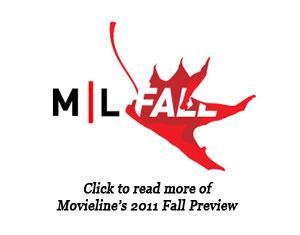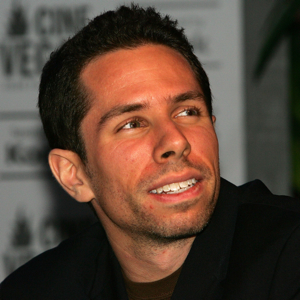Ask a Programmer: Movieline's Guide to 5 Major Fall Film Festivals
New York Film Festival (Sept. 30 - Oct. 16)
Title: Associate Director of Programming
How many years have you been with the festival?
Five as a member of the selection committee. Two as Associate Program Director for the Film Society.
How many films are in this year's festival? How many films were submitted?
There are 27 films in the Main Slate, which screen in our 1,100-seat Alice Tully Hall venue, plus more than 60 additional films and special events scheduled for the Walter Reade Theater and Elinor Bunin Munroe Film Center, including our Masterworks series (which features retrospectives, restorations and rediscoveries of classic cinema), a robust documentary sidebar, panel discussions, book signings and more. This year, we received more than 1,000 submissions (including shorts) to the festival.
Approximately how much time is spent planning your program each year?
As soon as one New York Film Festival comes to an end, we begin working in earnest on the next edition, which will be especially true this year as we head towards our 50th anniversary year. But the most concentrated programming period occurs between Cannes in May and the NYFF lineup announcement in August, when we convene the entire NYFF selection committee for an intense regimen of consideration screenings.
What are you looking forward to most this year?
Taking full advantage of our three new screening spaces in the Elinor Bunin Munroe Film Center to offer audiences the most ambitious and eclectic New York Film Festival in the festival's 49-year history.
How would you define your festival's identity, and how does it fit into the festival circuit?
As one of the oldest film festivals in North America, NYFF, in its early years, coincided with the explosion of the Nouvelle Vague in France and other "new waves" throughout Europe and Asia, as well as the arrival of "auteurism" as a (divisive) concept in American film criticism, drawing increased attention to directors as--for better or worse--the primary authors of their films.
 The NYFF was at the center of this, and its very presence on the campus of an august cultural institution like Lincoln Center (and, in the first year, MoMA) itself implied an equating of film with the other "high" arts that was then (and may still be) a controversial notion. In the half-century since, the festival's mission has largely remained the same, which is one of the things that helps NYFF to maintain a distinct profile in the ever more congested festival landscape. We still look to the world for important work from established masters and fresh new voices alike, and then present a highly curated (rather than exhaustive) selection in a grand setting that, we hope, captures some of that endangered magic of seeing movies on large screens with large audiences.
The NYFF was at the center of this, and its very presence on the campus of an august cultural institution like Lincoln Center (and, in the first year, MoMA) itself implied an equating of film with the other "high" arts that was then (and may still be) a controversial notion. In the half-century since, the festival's mission has largely remained the same, which is one of the things that helps NYFF to maintain a distinct profile in the ever more congested festival landscape. We still look to the world for important work from established masters and fresh new voices alike, and then present a highly curated (rather than exhaustive) selection in a grand setting that, we hope, captures some of that endangered magic of seeing movies on large screens with large audiences.
How has festival programming changed since you started? (In terms of politics, number of fests, volume of films, etc.)
As a (relative) newcomer to festival programming, I can't claim to have witnessed seismic changes in the festival programming landscape, though there's no denying that the number of films being made, and the number of festivals vying to screen them, grows ever larger. I'm fond of quoting something the great Iranian director Abbas Kiarostami said to me in a 2001 interview, just around the time he himself had begun to embrace digital filmmaking technology: that only in the digital era will we know who all of the greatest filmmakers in the world are, because the availability of inexpensive cameras and editing equipment makes it possible for anyone to make a film now, the way anyone can write a novel or paint a picture. Kiarostami himself was far too diplomatic to add that we may also now discover who all of the worst filmmakers in the world are, though that's certainly true too. All of this makes the work of programmers more challenging, but also that much more rewarding when you find a cinematic diamond in the rough, or help to introduce a bold new talent to a wider audience.
Has awards season's ascendancy impacted the fall festival climate for better or worse?
As I blogged about earlier this year, the ever-lengthening "awards season" has definitely placed a greater spotlight on festivals like Palm Springs and Santa Barbara, which, by virtue of where they fall in the calendar, have evolved from quality regional festivals into high-profile whistle stops on the Oscar campaign trail -- something that works out nicely for those festivals, and for the filmmakers and performers they honor, who now stand to collect more awards for a single movie than they might once have amassed over the course of their entire careers. There has also been a noticeable uptick in the number of bloggers and reporters now flocking annually to the once relatively media-free Telluride Film Festival, which, thanks to a remarkable track record of including multiple future Best Picture nominees in its very discerning selection, has become seen as the true kickoff to the fall awards race.
Whether this is for good or ill, I won't hazard to guess. Certainly, thanks to the Internet more people now know more about the business of making movies than ever before, and to try to pretend that movies are only an art and not also a business is a fool's errand indeed. But I do fear that when the reporting shifts too much towards the hype and marketing and other noise surrounding a movie's release and away from an intelligent discussion of the movies themselves, we lose something valuable in the process.
Place us in a selection committee meeting. What are the conversations? What are the disagreements? How are they resolved?
Well, that's the $64,000 question, isn't it? Over the years, more than one documentary filmmaker has approached the Film Society about documenting the NYFF selection process, which we have always politely declined. If the cameras were permitted to roll, however, the footage would probably be markedly less dramatic than most people imagine. Although I suspect the NYFF has weathered more contentious eras, speaking for my own five years on the committee what might surprise people most is how much rapport there is among the five committee members, despite our very different backgrounds, the different audiences we write for, and (as anyone who reads us knows) our differences of taste. In part, that's because everyone is consciously working towards the same goal--a balanced program that paints a vivid picture of world cinema today. That may mean having to discard a few personal favorites along the way, or even finding yourself arguing the merits of a film that you yourself don't feel much enthusiasm for. A programmer always has to keep the bigger picture of the entire festival program--and the audience's interaction with that program--in mind in a way that a critic, engaging directly with one particular film, does not.
What do you most look forward to at each year's festival? What do you least look forward to at each year's festival?
I think the things you look forward to and the things you don't are very much one in the same. On the one hand, I love the selection process, because it's exciting to go into a theater every morning and know next to nothing about what you're going to see next, except maybe the title and who directed it. On the other hand, as I once wrote about, the process is both physically and psychologically exhausting in the way of few things I have ever experienced in life. By comparison, the actual festival in the fall is a breeze, though there are still a lot of very long days (and nights) and the constant pressure to make sure we put on the best show possible.
What's your favorite festival memory?
Introducing a sold-out midnight screening of Abel Ferrara's Go Go Tales in 2007 with the always unpredictable Ferrara in a very lively mood, and an audience that included Grace Jones and the inimitable Sylvia Miles. Things got progressively stranger as the night wore on, culminating in a 2 AM Q&A session that those who were present still speak of fondly.
What's your advice for aspiring festival programmers?
Keep your eyes open and your ears to the ground--exciting and unexpected things are happening all the time in moviemaking, and sometimes from the places you least expect. Keep your mind open too--no work should ever be dismissed out of hand just because it may not ostensibly seem like a "festival" movie, whatever that means anyway. Above all, never underestimate the intelligence of the audience--they're smarter and more curious than they usually get credit for, ready to go on the journey so long as you point the way.


Comments
This is great. Thanks for this.
Thanks very much for this. I happen to be flying into New York for a few days the night their festival opens. Don't know how feasible it is to hope for a ticket to something.